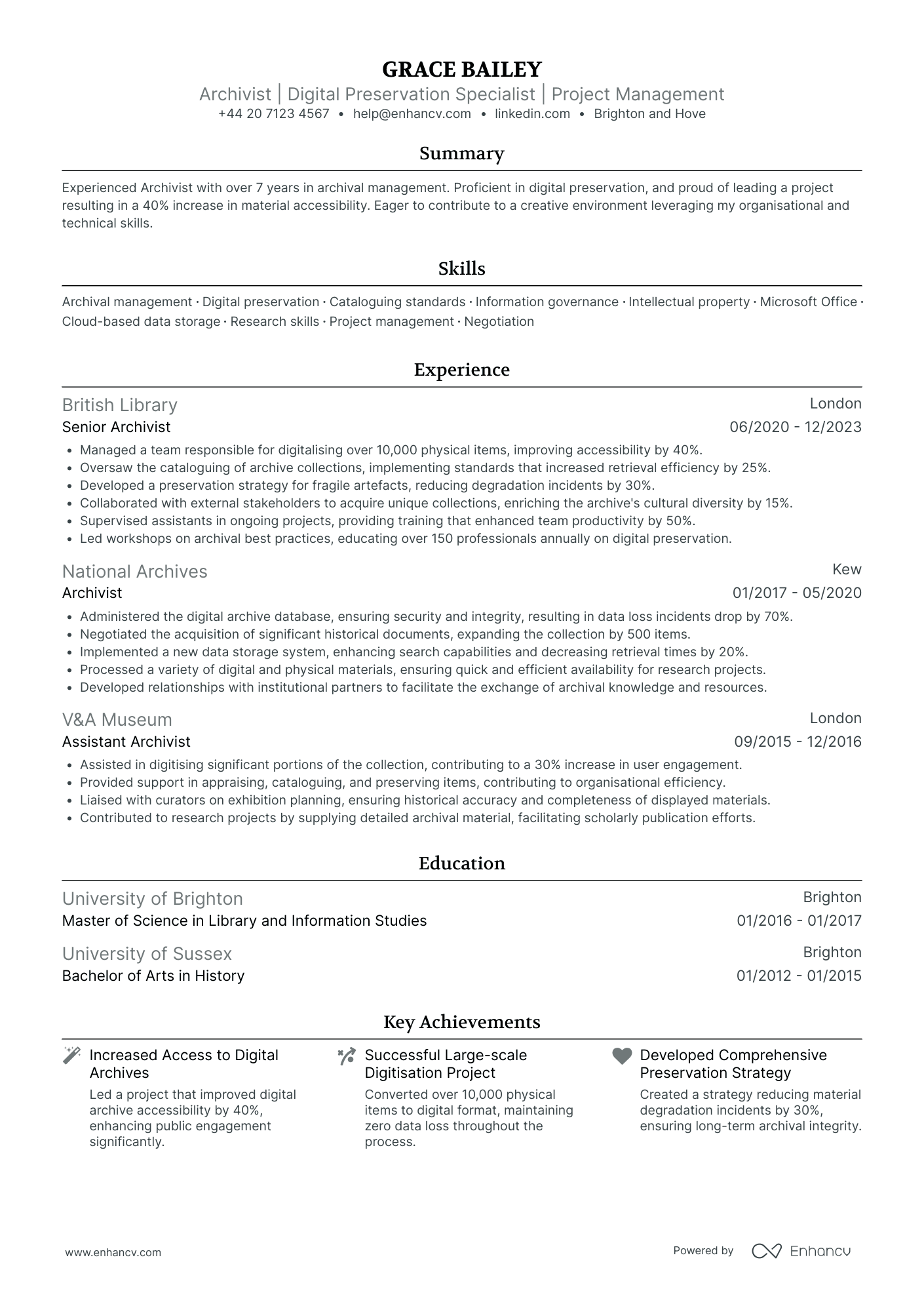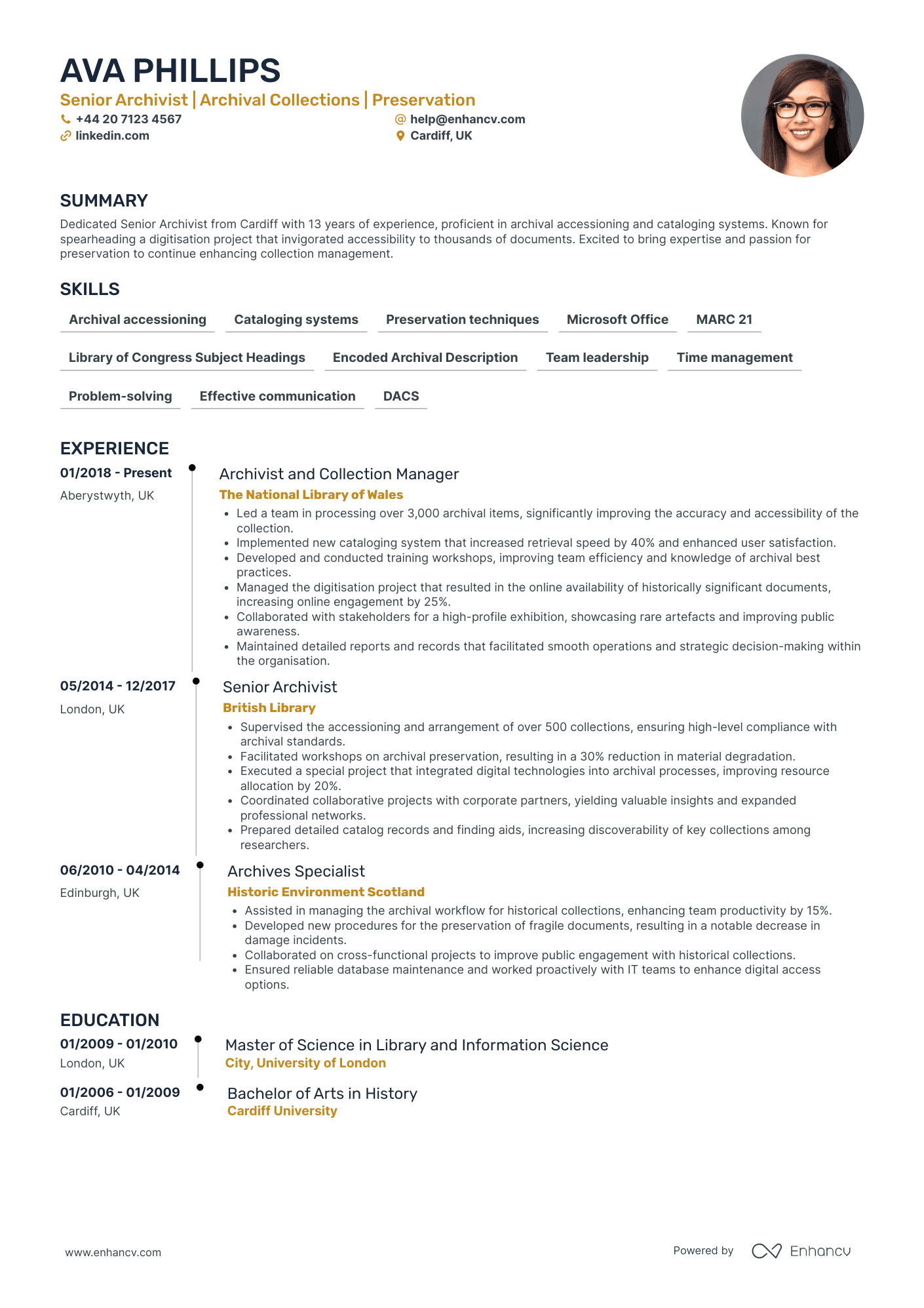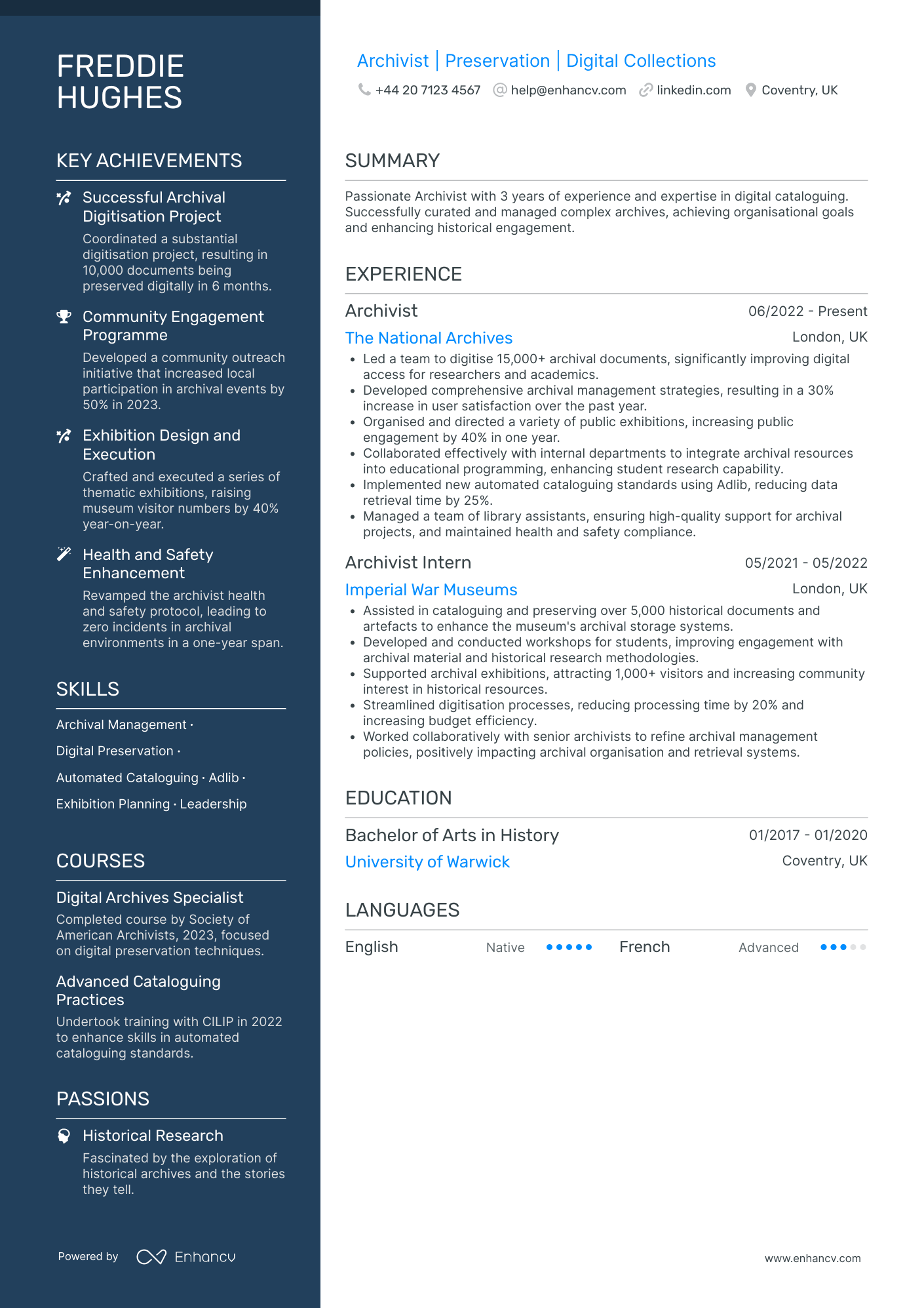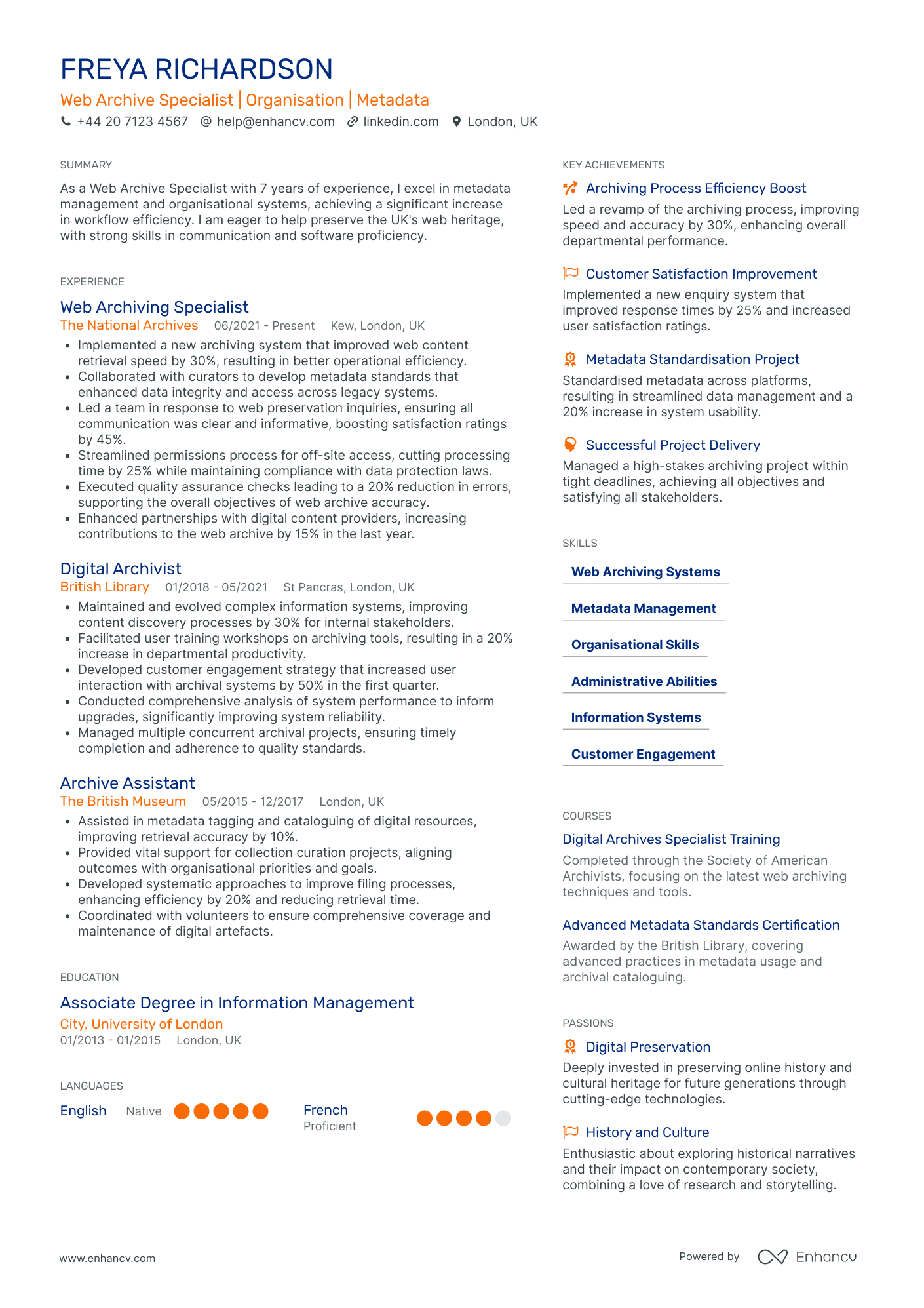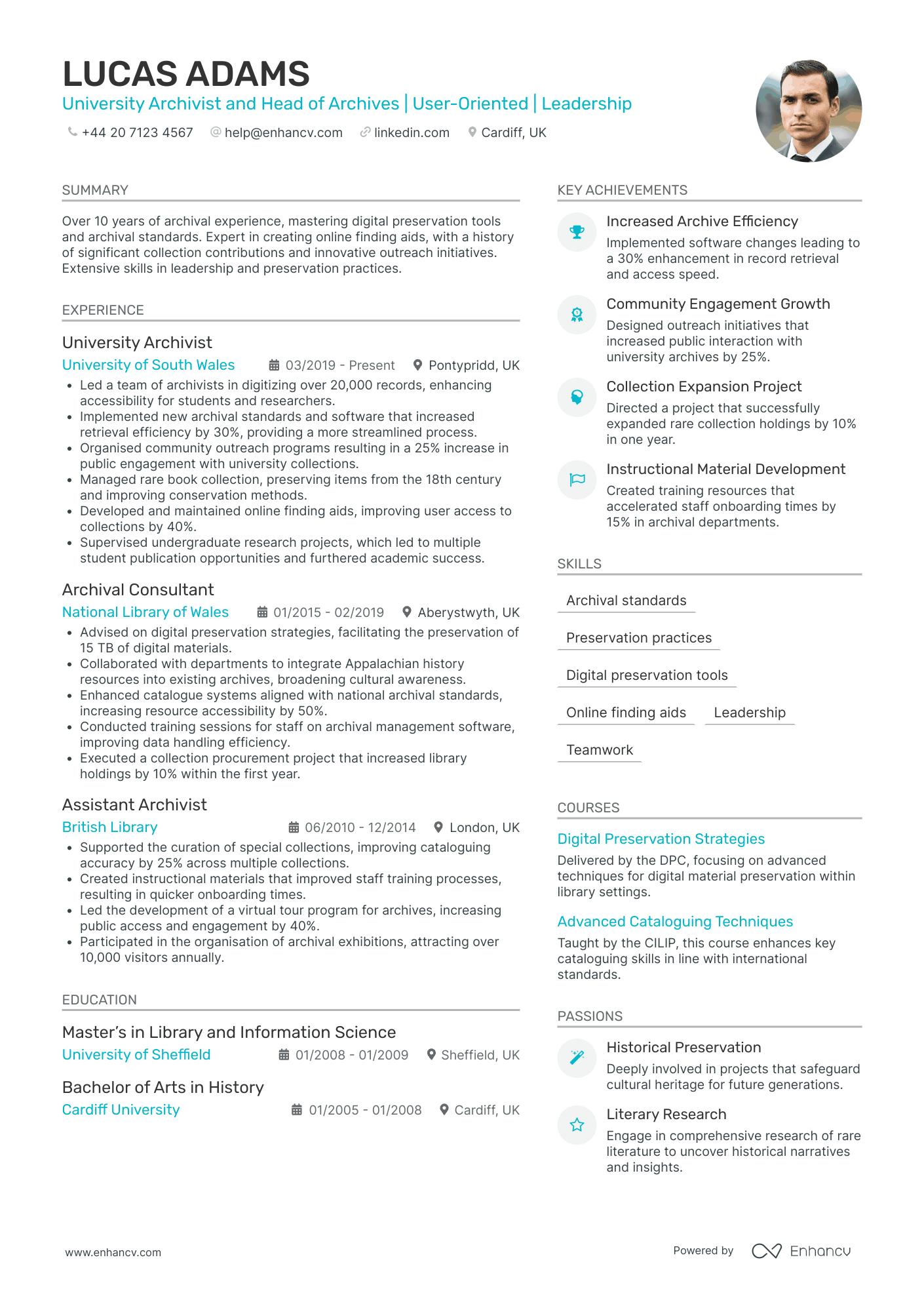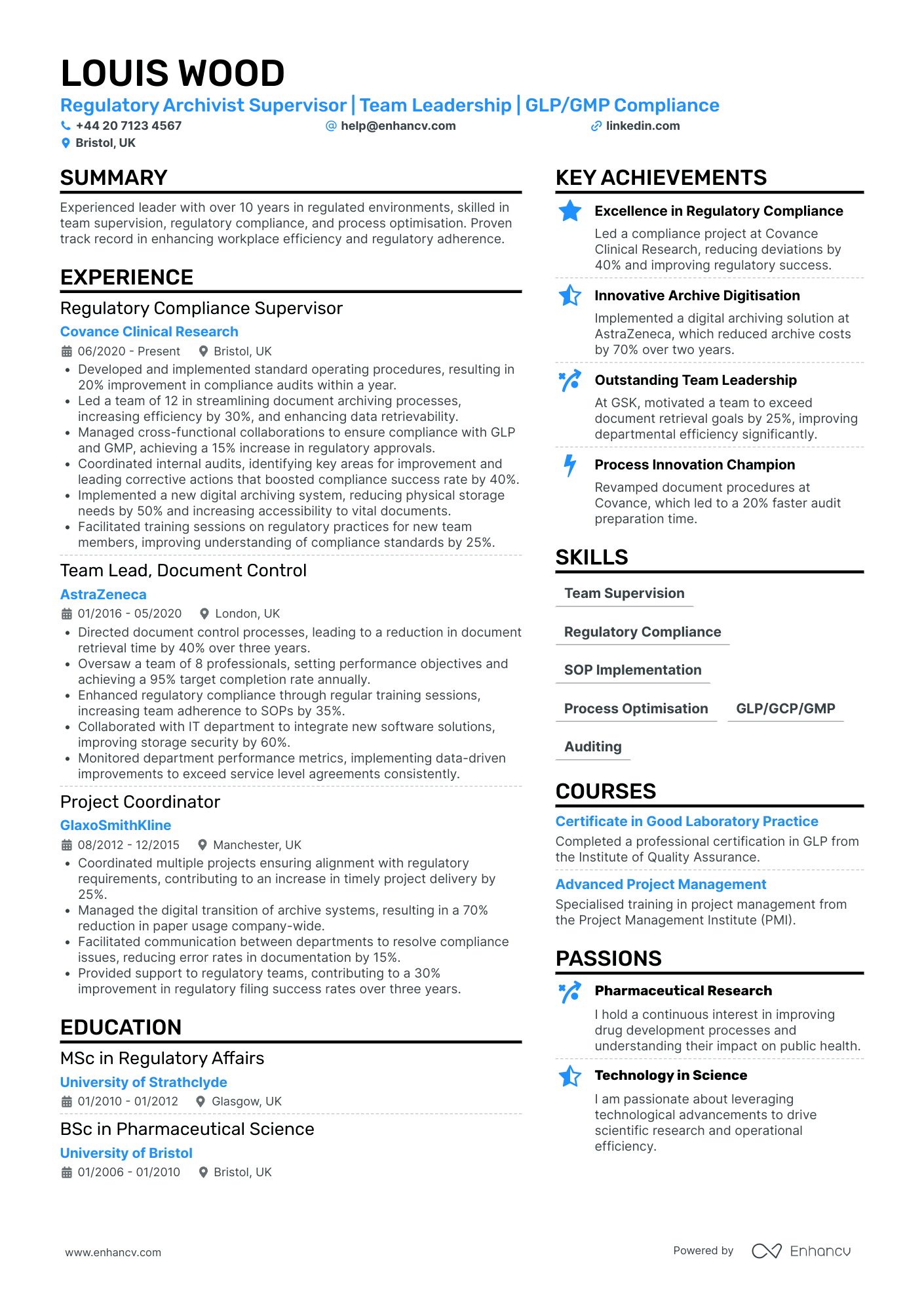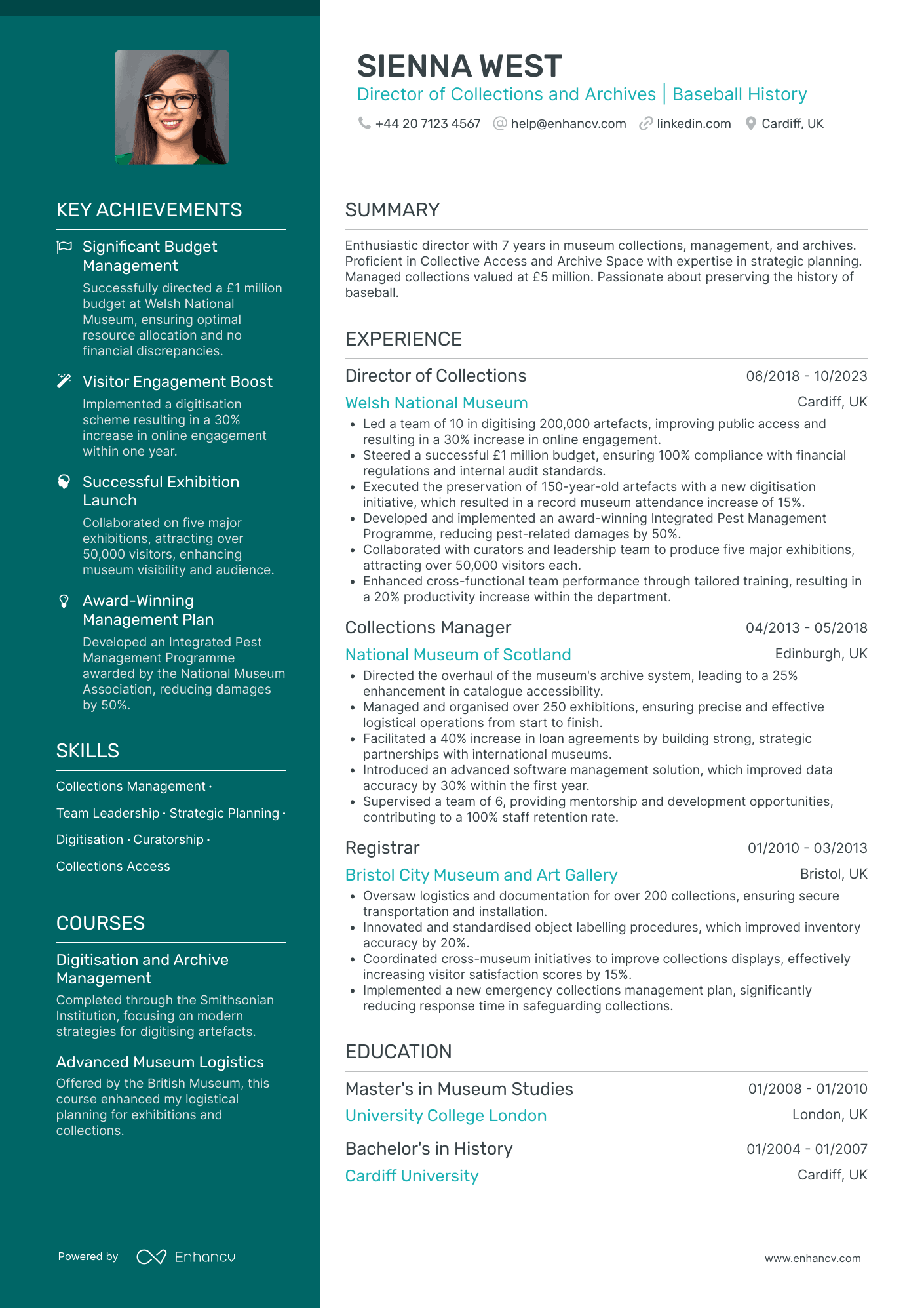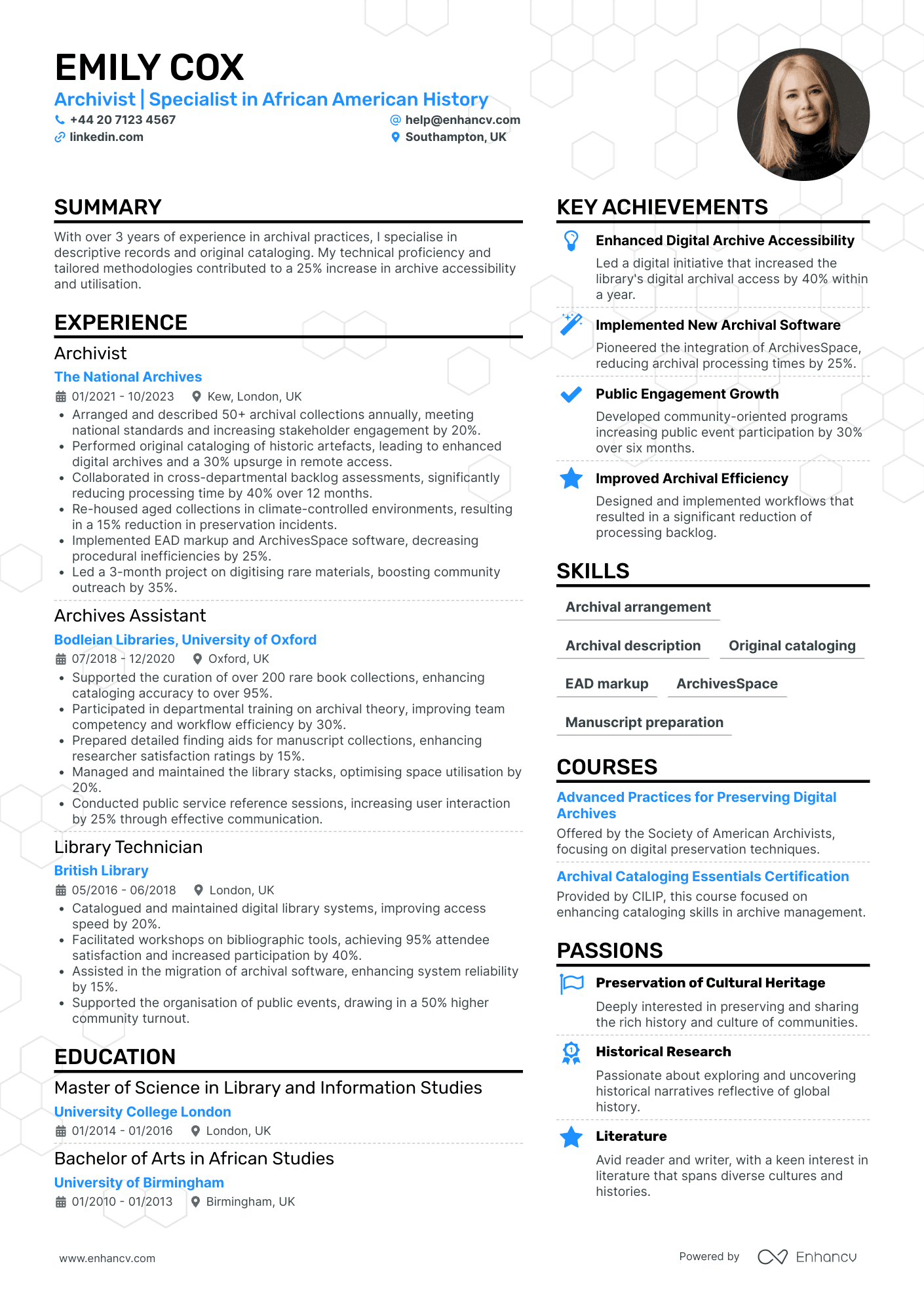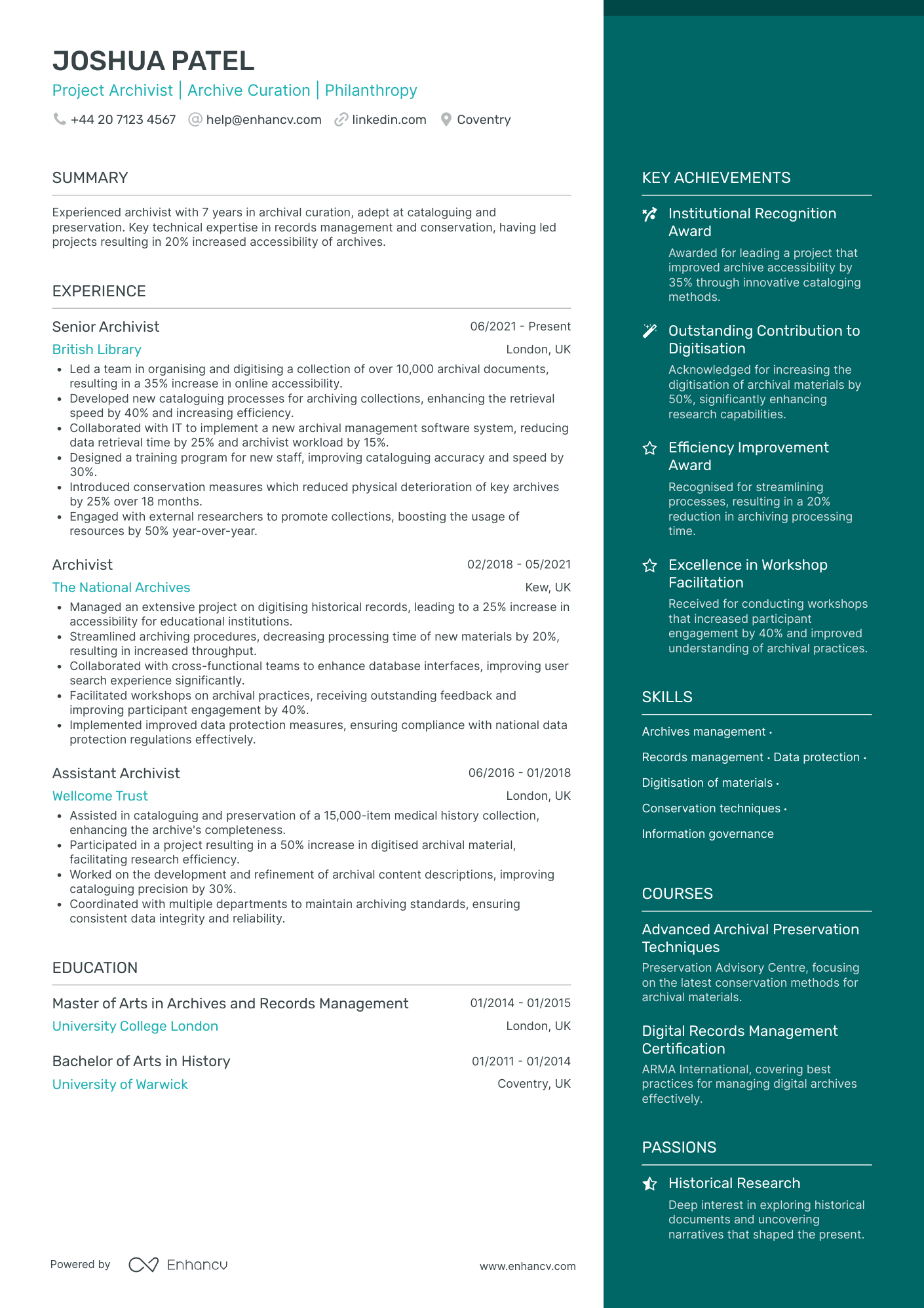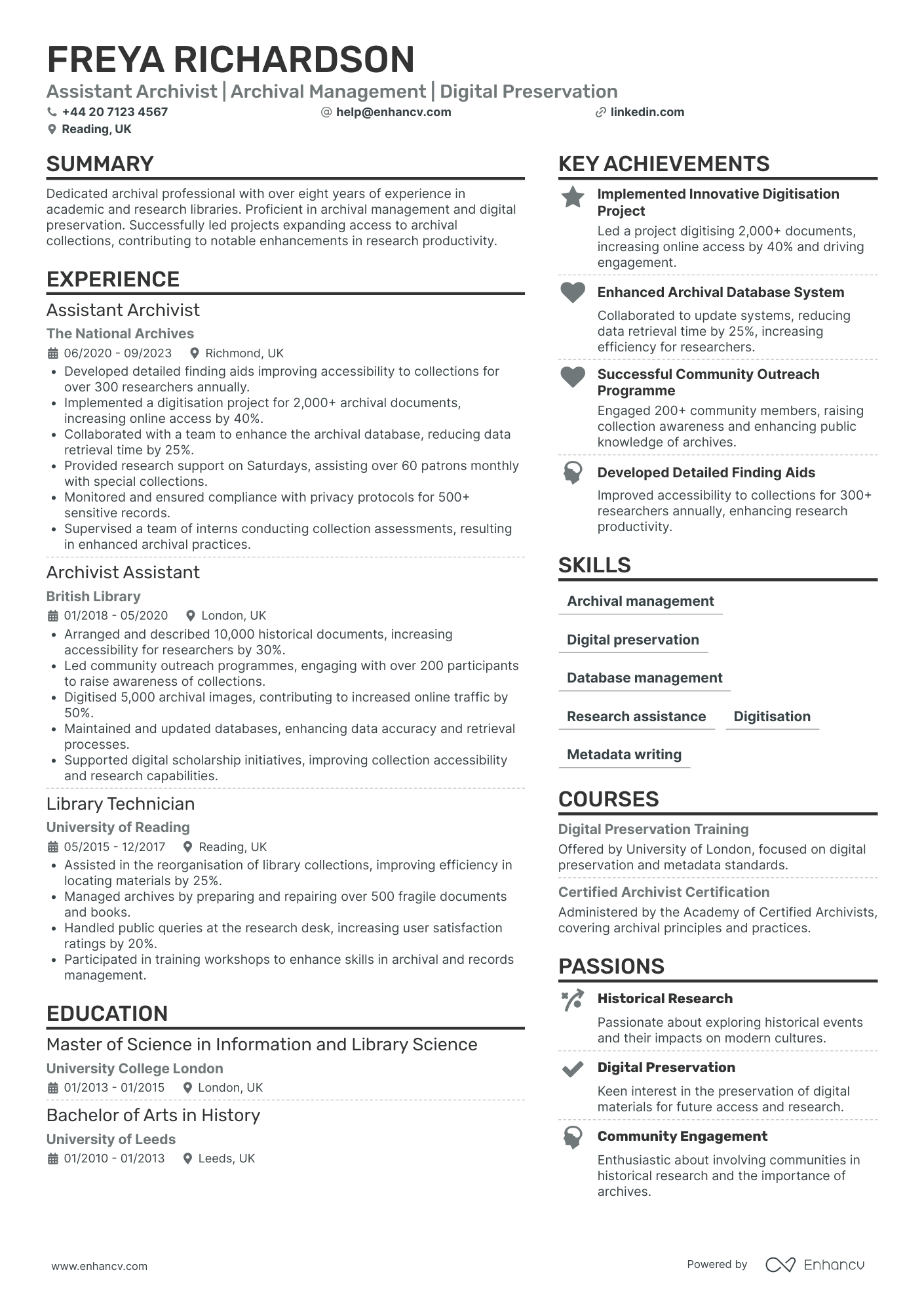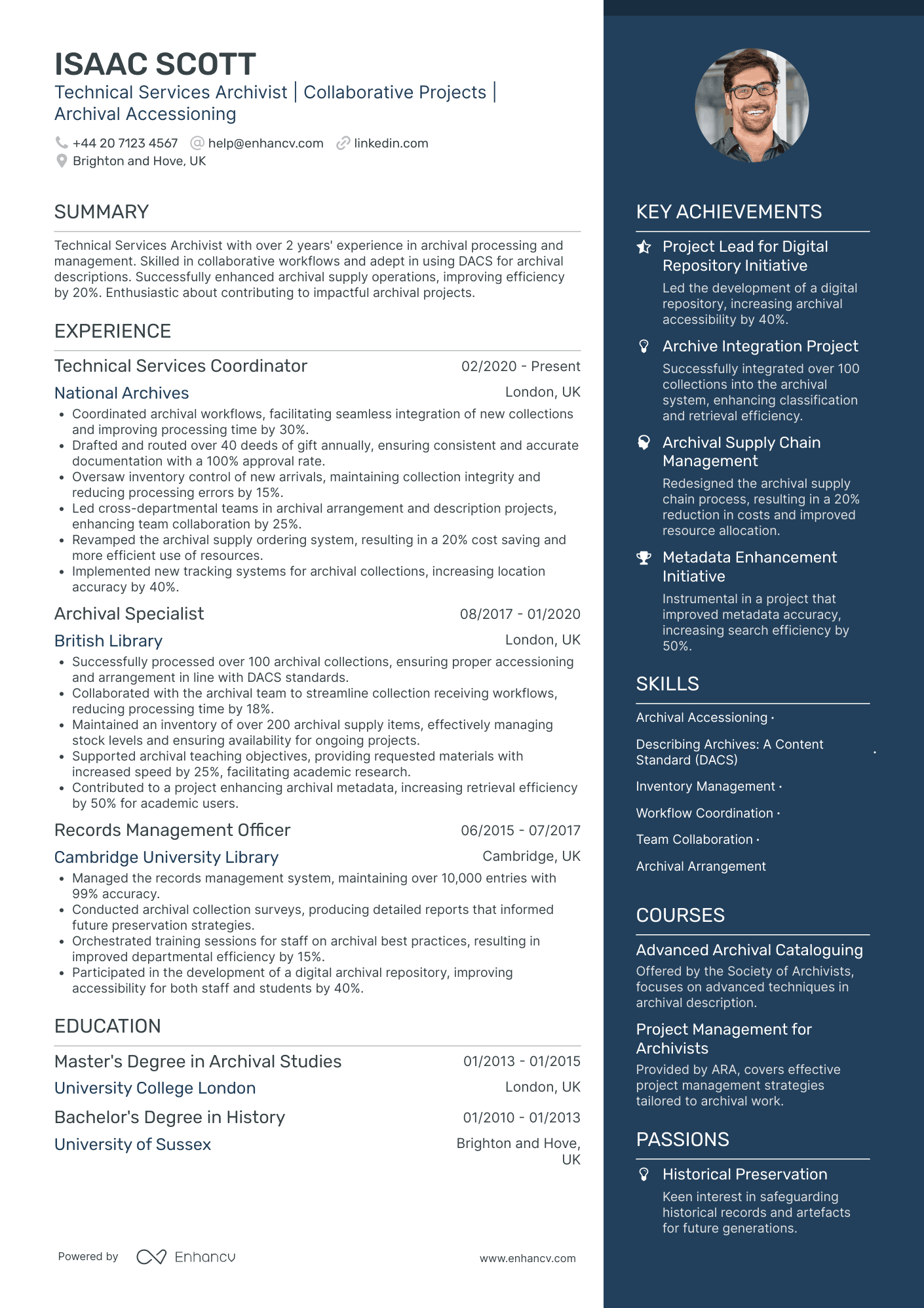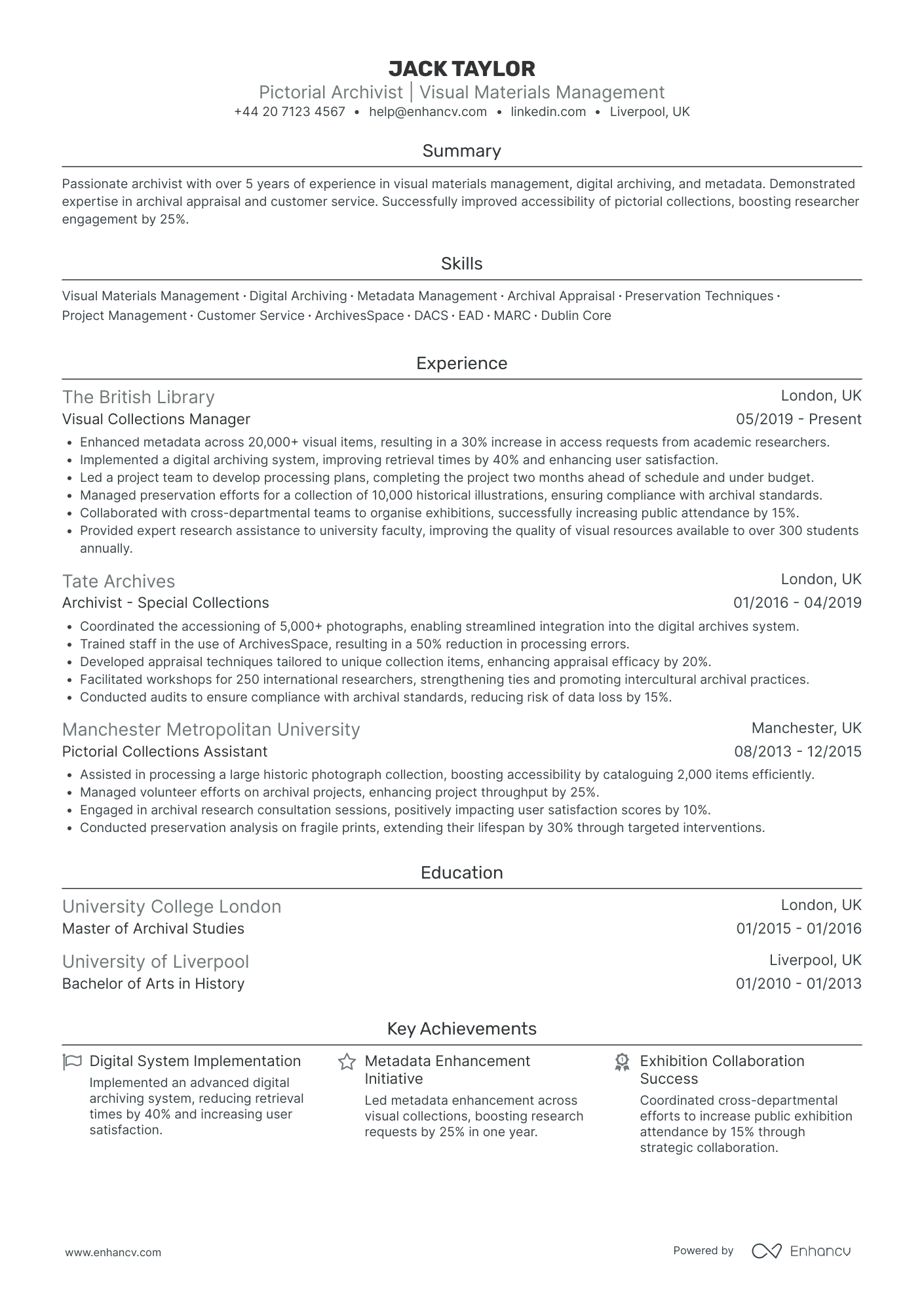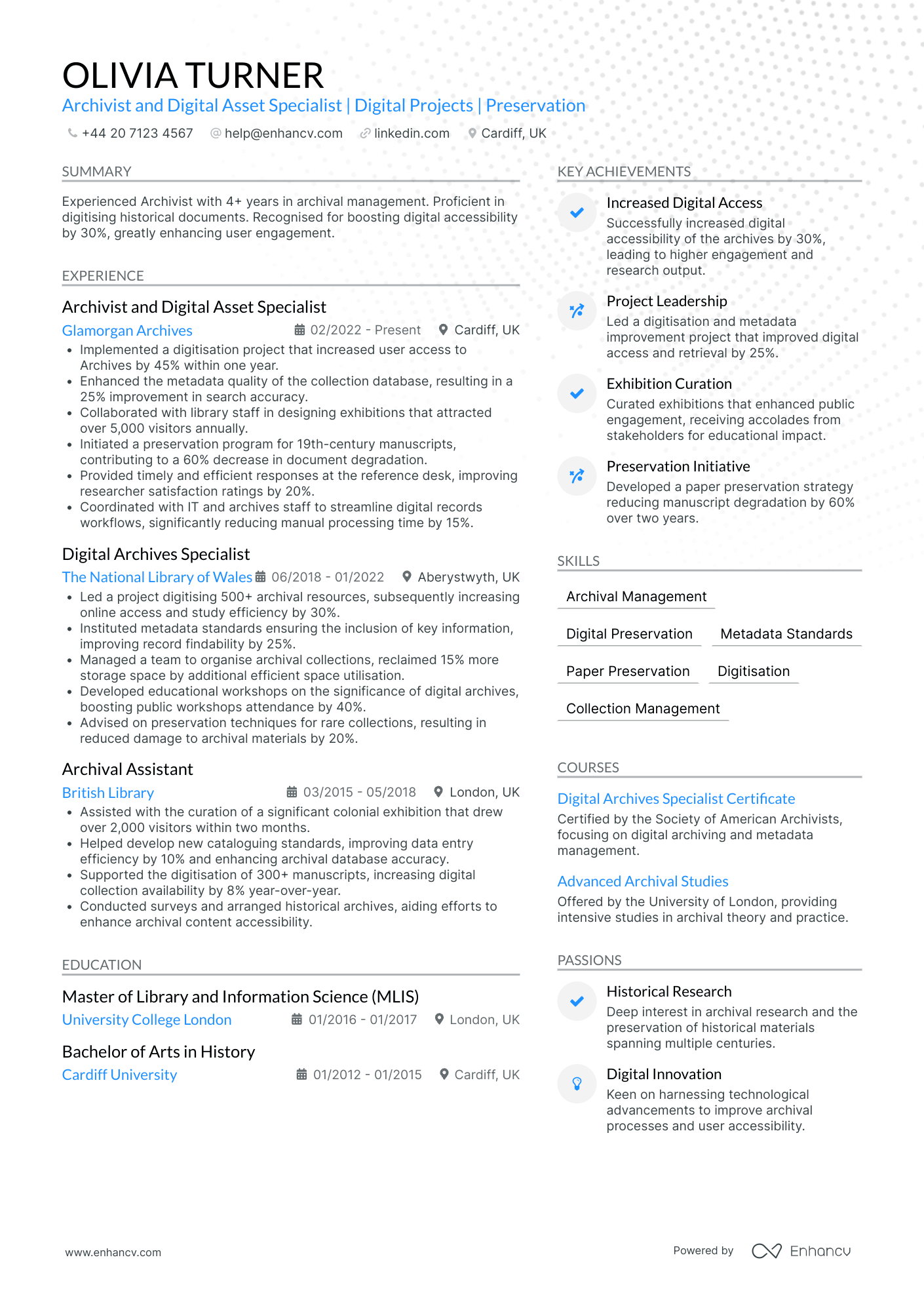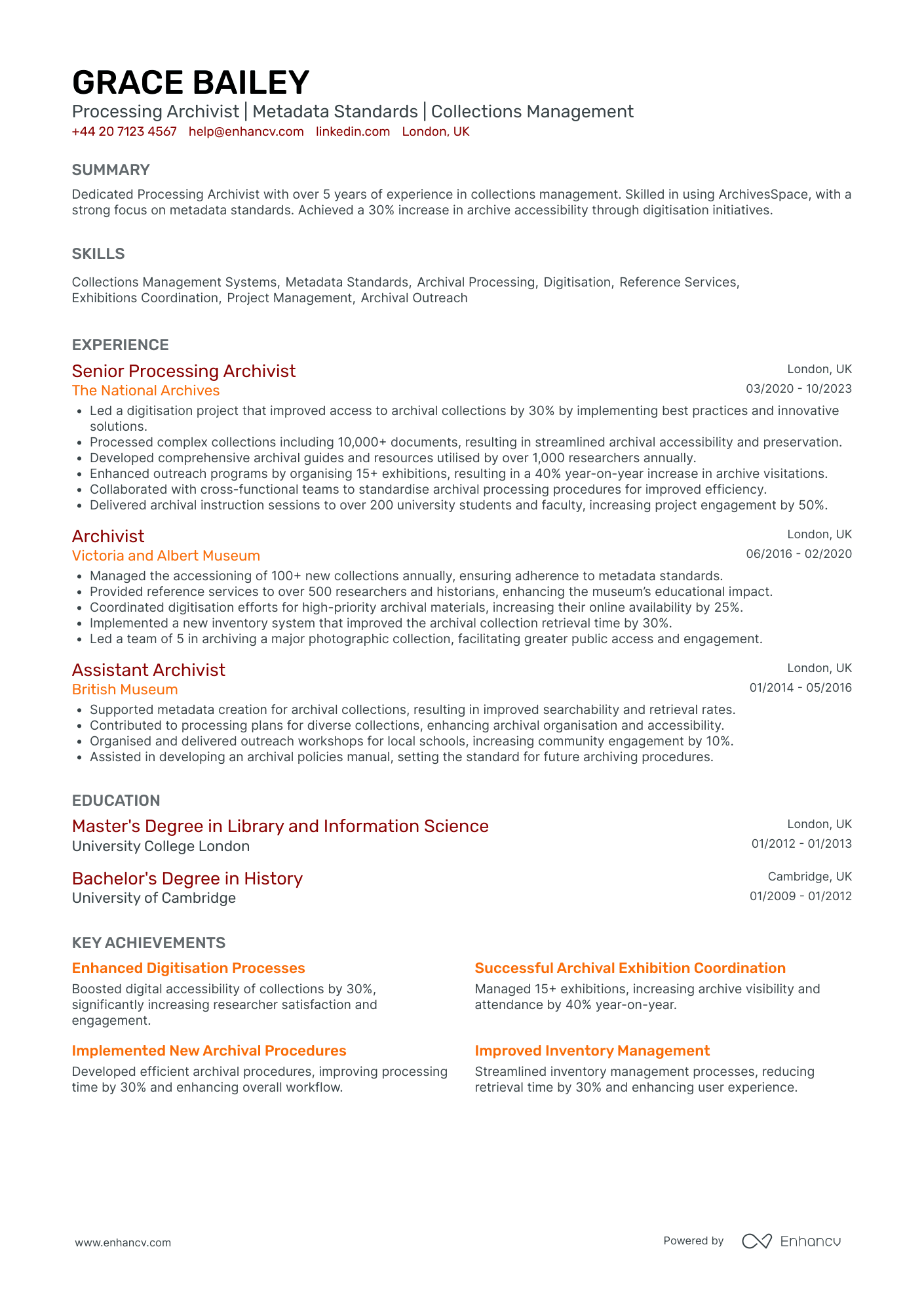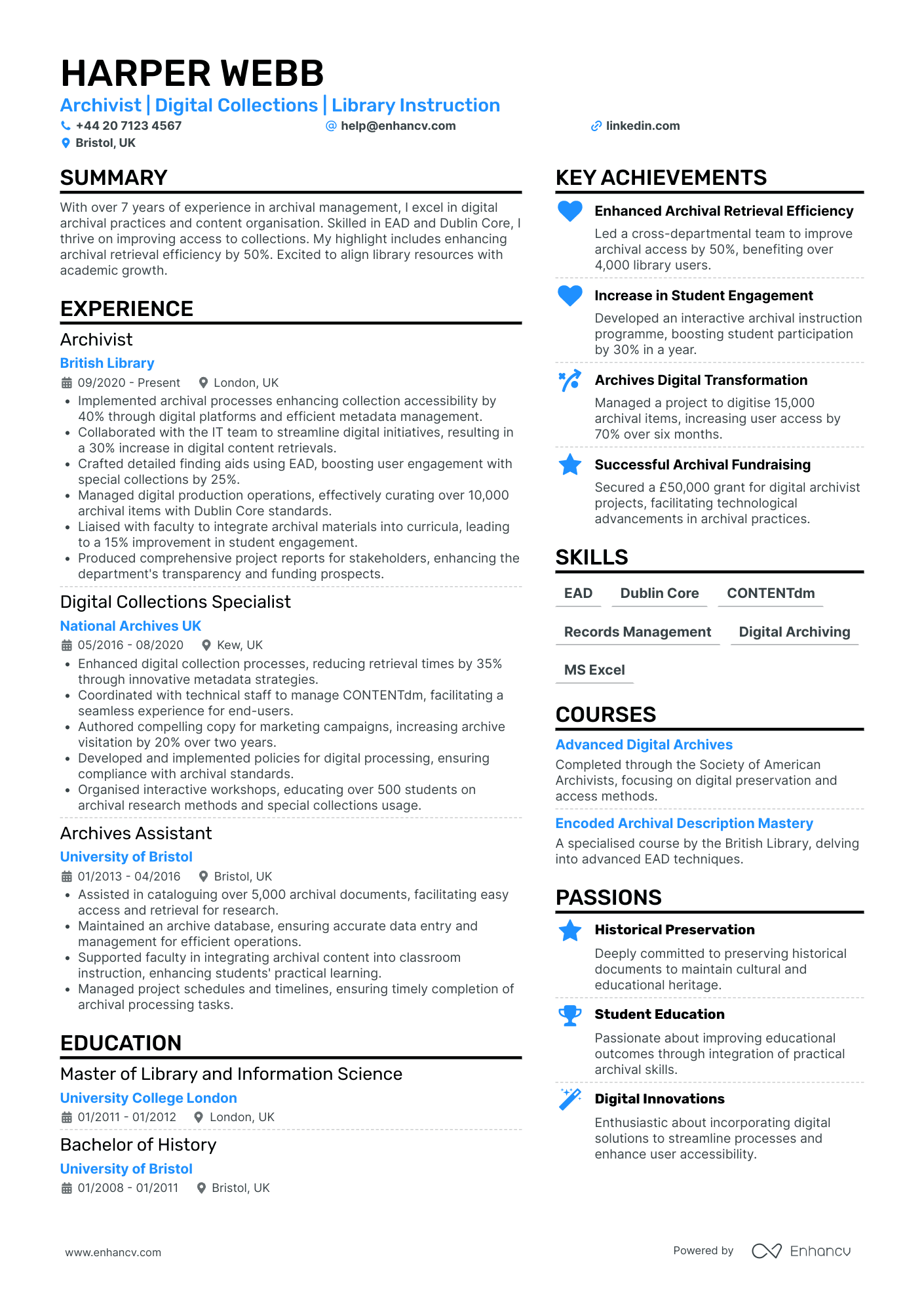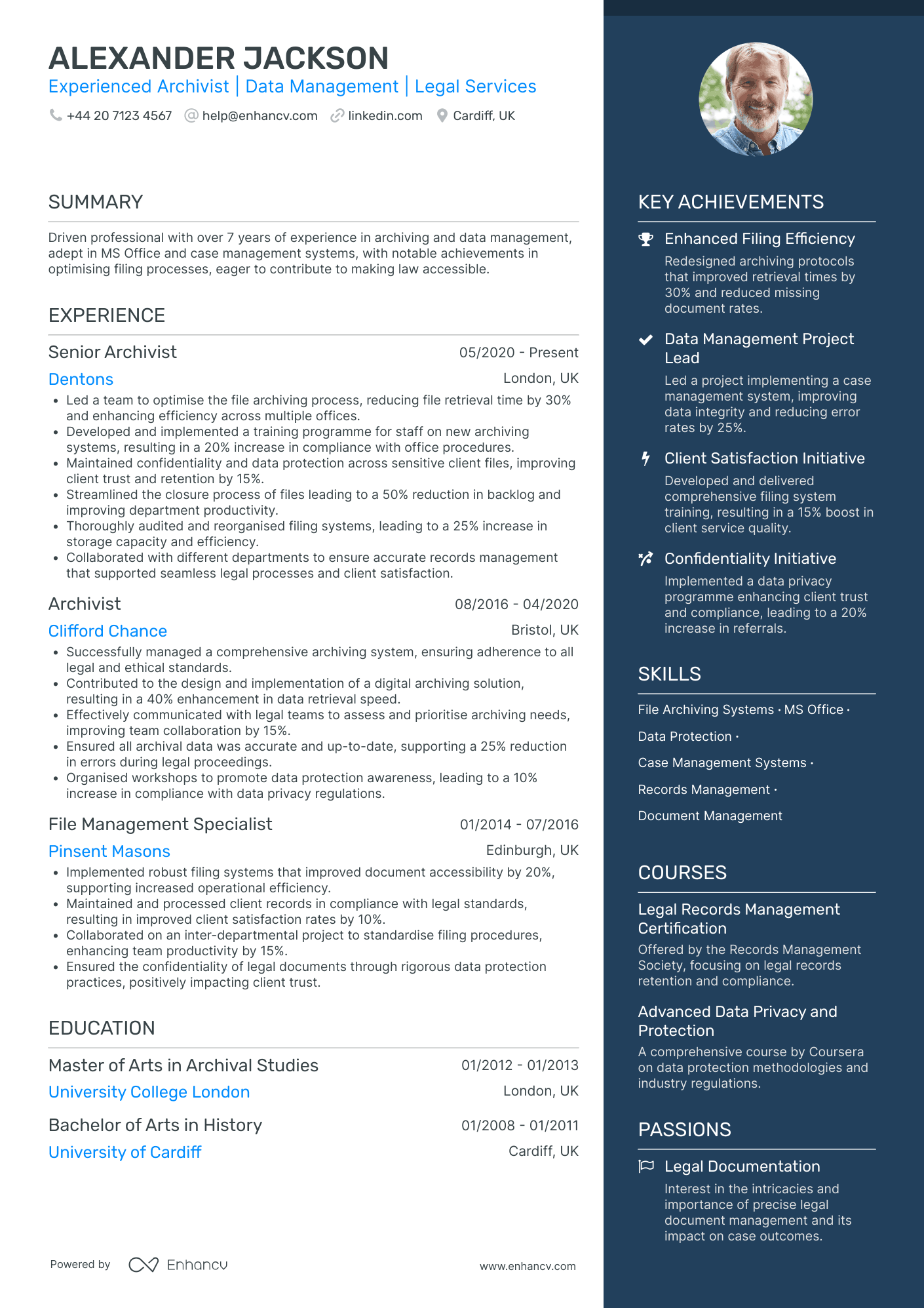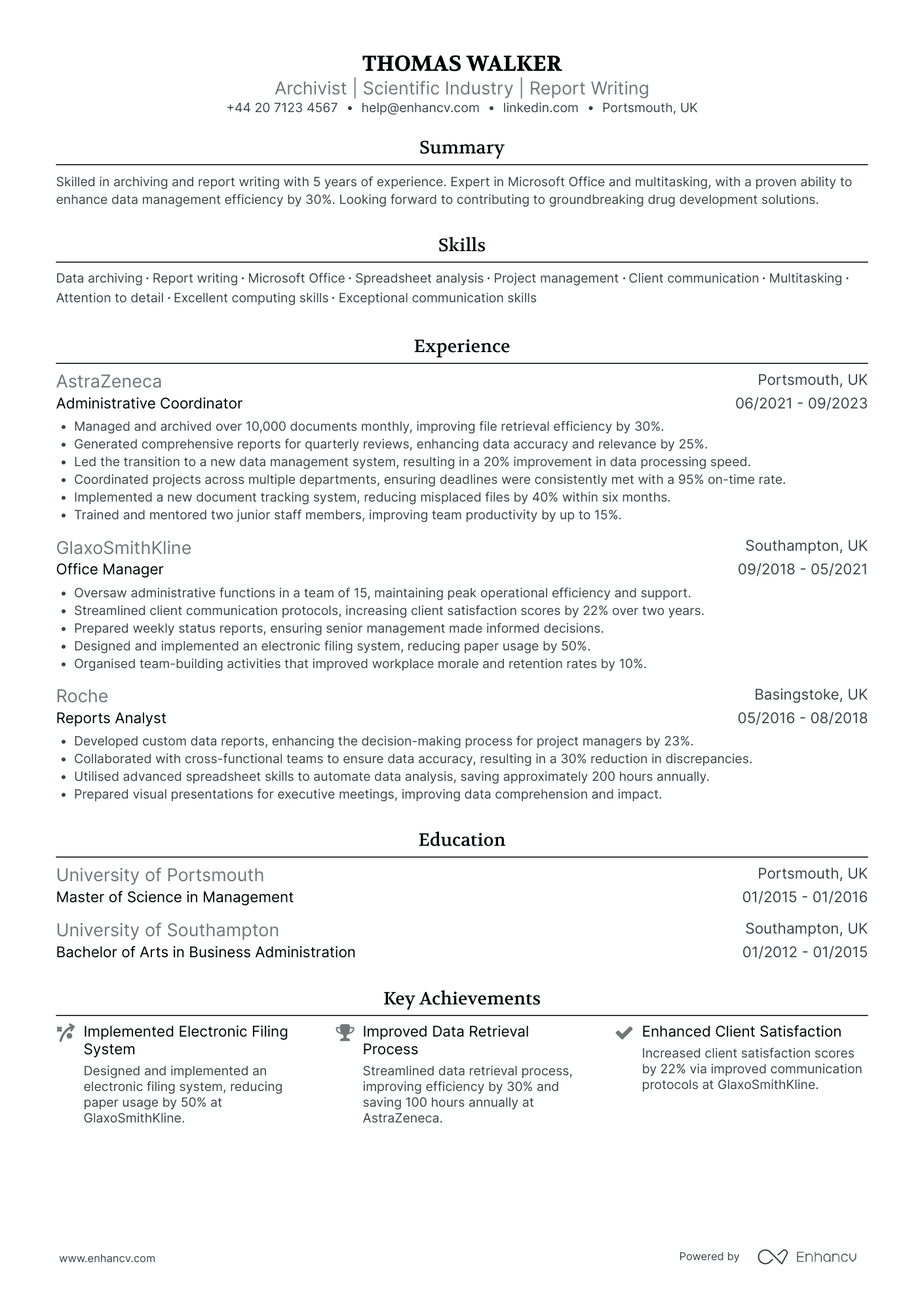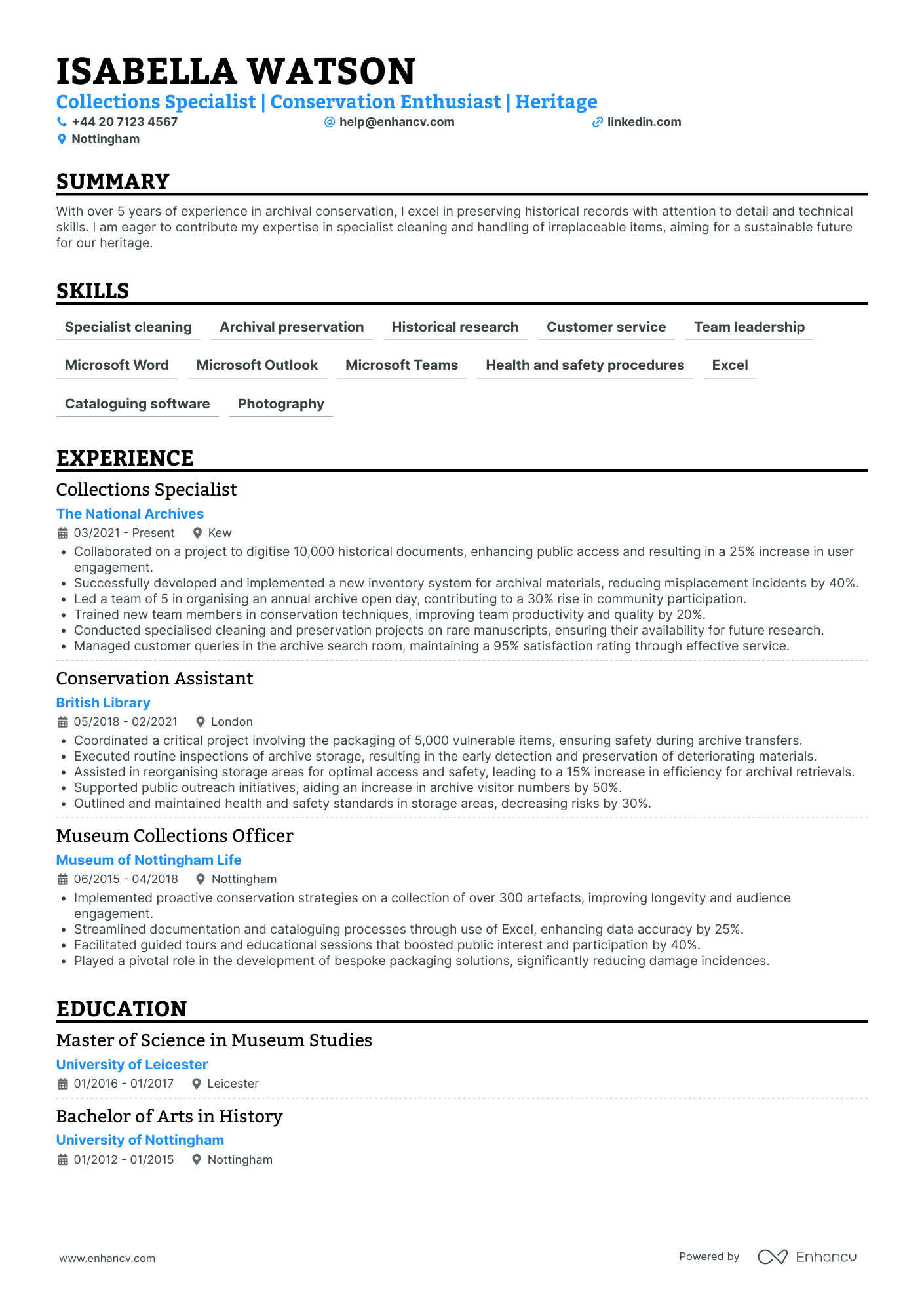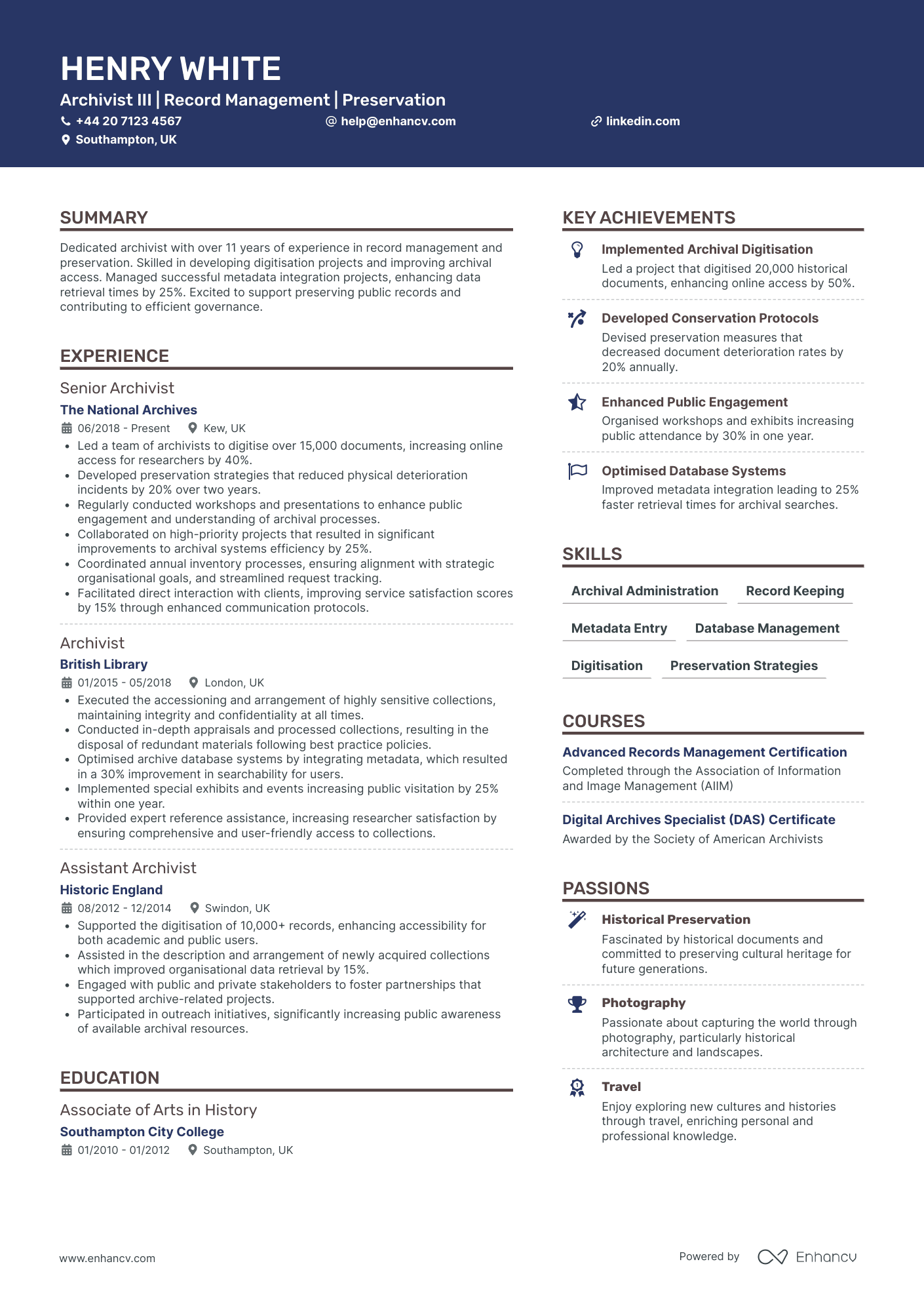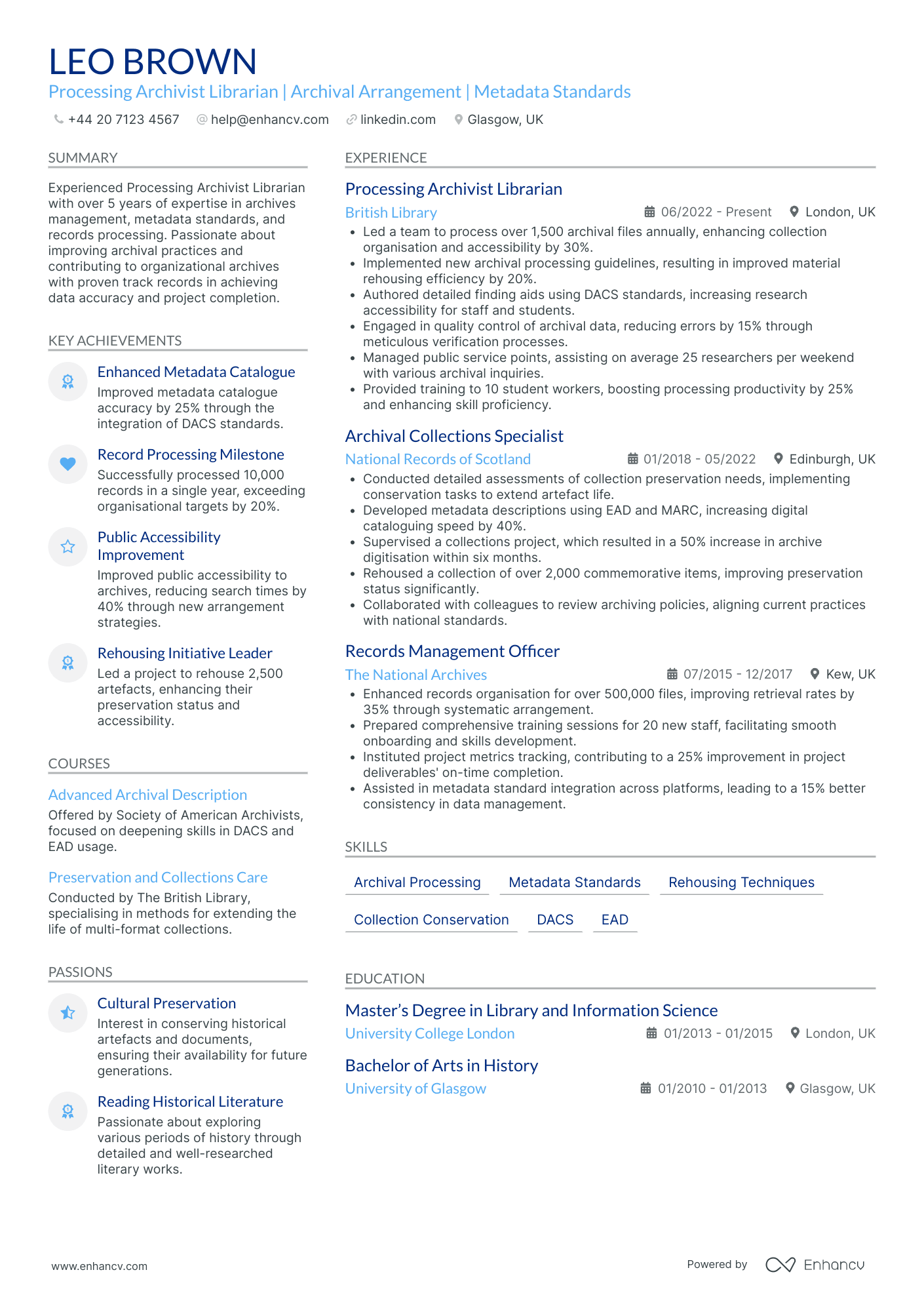Ensuring that your CV adequately highlights your experience with digital preservation and archival databases is a significant challenge in showcasing your professional aptitude as an archivist. Our guide will provide you with targeted advice on effectively demonstrating your technical proficiency, ensuring that your key skills are noticed by potential employers.
- Applying best practices from real-world examples to ensure your profile always meets recruiters' expectations;
- What to include in your work experience section, apart from your past roles and responsibilities?
- Why are both hard and soft skills important for your application?
- How do you need to format your CV to pass the Applicant Tracker Software (ATS) assessment?
If you're writing your CV for a niche archivist role, make sure to get some inspiration from professionals:
Resume examples for archivist
By Experience
Archivist Manager
- Strong Career Growth and Leadership - Grace Bailey's career progression from Assistant Archivist to Senior Archivist illustrates a clear trajectory of growth and leadership. Her responsibilities expanded significantly over time, including team management and strategic decision-making at the British Library. This showcases her ability to take on increasing levels of responsibility and lead initiatives that align with organizational goals.
- Comprehensive Project Management and Impact - The CV highlights several projects that Bailey led to fruition, such as the digitization of over 10,000 items and the implementation of a preservation strategy that reduced degradation incidents by 30%. These achievements are not just about numbers but point to business relevance in terms of improved accessibility, cultural diversity, and material integrity, emphasizing her capability to drive impactful projects with measurable results.
- Integration of Digital Innovation in Archiving - Grace Bailey’s work involved cutting-edge methodologies like advanced digital preservation and digital archiving, showcasing her adeptness with contemporary tools and approaches in the archival field. Her course participation and project outcomes reflect her commitment to incorporating digital innovation in traditional archiving, a crucial skill in the rapidly evolving field of digital information management.
Senior Archivist
- Structured and Comprehensive Presentation - Ava Phillips' CV is well-organized, beginning with a concise personal summary that highlights key professional attributes and experience. The structure seamlessly transitions from work experience to education, skills, and personal achievements, providing an intuitive flow that guides the reader through her career highlights and qualifications.
- Progressive Career Growth in Archival Management - The CV clearly demonstrates a steady upward trajectory in Ava's career, from an Archives Specialist to a Senior Archivist and then an Archivist and Collection Manager. This progression shows her growing responsibilities and the trust placed in her by reputable institutions in the archival field, such as The National Library of Wales and the British Library.
- Impactful Achievements with Quantifiable Results - The CV effectively showcases Ava's achievements with specific, measurable outcomes, such as the introduction of a cataloging system that improved retrieval speed by 40% and digital projects that increased user engagement by 25%. These accomplishments underline her capability to implement strategies that significantly enhance operational efficiency and public accessibility.
Junior Archivist
- Content Presentation and Structure - The CV excels in organization and clarity, presenting each section in a logical and concise manner, making it easy to navigate through Freddie Hughes's career details. Each segment effectively starts with a brief header, and the information is laid out clearly for straightforward reading.
- Career Trajectory and Growth - Freddie Hughes's career shows a well-defined trajectory from an intern to a leading archivist role at The National Archives, reflecting professional growth and increasing responsibilities. This progression is indicative of his ability to learn quickly and adapt to higher levels of responsibility within the same industry.
- Unique Industry-Specific Elements - The inclusion of tools and methodologies such as Adlib for automated cataloguing and the digitization projects demonstrates a deep understanding of current archival practices. This not only highlights Hughes's technical proficiency but also his continuous effort to stay updated with industry-specific software and techniques.
Archivist Assistant
- Clear presentation and organization - The CV is well-structured, starting with the candidate's contact details followed by a concise summary. Each section is clearly defined, allowing easy navigation throughout the document. Bullet points are effectively used to highlight achievements and responsibilities, making the content easily digestible at a glance.
- Focused career trajectory in preservation and metadata - Freya Richardson showcases a clear pathway of professional advancement in the web archiving and digital preservation field. Starting as an Archive Assistant, advancing to a Digital Archivist, and culminating as a Web Archiving Specialist, the CV illustrates progressive career growth within prestigious institutions in the UK, highlighting an accumulating expertise in metadata management and archiving systems.
- Emphasis on soft skills and team leadership - The CV highlights the candidate's ability to lead teams and cultivate collaborations, essential qualities for a Web Archive Specialist. Achievements such as improving satisfaction ratings and streamlining communication processes demonstrate strong interpersonal skills, while the courses and passion sections underline her commitment to continuous learning and innovation in digital preservation.
Head Archivist
- Strong and Structured Content Presentation - The CV’s content is precisely laid out with clear headings, facilitating easy navigation. Each section is concise yet informative, ensuring vital information on skills, experiences, and achievements is accessible. This structure allows readers to gain a comprehensive understanding of the candidate’s qualifications quickly.
- Impressive Career Trajectory - Lucas Adams’ career progression is marked by consistent growth in responsibility and leadership roles. Beginning as an Assistant Archivist at the British Library, advancing to an Archival Consultant, and eventually becoming the University Archivist speaks to a clear upward trajectory in the archival field. This growth reflects a deepening expertise and increasing influence in industry circles.
- Noteworthy Achievements with Significant Impact - The CV highlights achievements that have tangible impacts, such as increasing retrieval efficiency by 30% and public engagement by 25%. These accomplishments demonstrate Lucas's ability to improve processes and foster community involvement, which are crucial for the continuous development of archival accessibility and relevance.
Archivist Supervisor
- Clear and Structured Presentation - The CV is well-organized, starting with a concise summary that immediately communicates the candidate's expertise in regulatory environments. Each section flows logically, with bullet points enhancing readability and allowing for quick absorption of key achievements and responsibilities.
- Impressive Career Growth and Industry Experience - Louis Wood's career trajectory illustrates significant growth, moving from a project coordinator at GlaxoSmithKline to a supervisory role at Covance Clinical Research. This upward progression reflects his strengthened expertise and leadership abilities in the pharmaceutical industry, maintaining a focus on regulatory compliance.
- Impactful Achievements and Business Relevance - The CV emphasizes achievements that have had a substantial business impact, such as reducing deviations by 40% at Covance, streamlining document processes for faster audits, and implementing cost-effective digital solutions. These accomplishments highlight his capacity to improve operational efficiency and regulatory success, providing clear value to his employers.
Archivist Director
- Emphasizes strategic leadership and project management skills - The CV showcases Sienna West's ability to lead and manage teams effectively, her role as Director of Collections indicating a high level of responsibility and leadership skills. Her achievements in improving departmental productivity and compliance with financial regulations emphasize her strategic planning and project management capabilities.
- Highlights cross-functional collaboration and partnerships - Sienna West has demonstrated the ability to work across various departments and with external partners, as seen in her collaborations with curators and international museums. This adaptability and dedication to building strategic partnerships are crucial, especially in the museum and archival sector.
- Showcases specialized expertise in museum-specific technologies - The CV effectively communicates her proficiency with museum-related software such as Collective Access and Archive Space, which are critical for collections management. Additionally, her role in implementing a new digitization initiative indicates her technical depth and innovative approach to preserving and presenting historical content.
By Role
Digital Archivist
- Structured and Detail-Oriented Presentation - The CV is organized for easy navigation with distinct sections like experience, education, and skills. The bullets under each job role clearly outline achievements, providing both quantifiable results and qualitative insights into her performance.
- Progressive Career Development - Emily Cox’s career trajectory showcases steady growth within the library and archival field. Starting as a Library Technician and advancing to a specialized Archivist role, her progression highlights a commitment to her field and the acquisition of increasingly complex responsibilities.
- Indispensable Technical Skills in Archival Management - Her proficiency in industry-specific tools like EAD markup and ArchivesSpace, as well as her engagement with digital archiving processes, demonstrates an industry-relevant technical depth that is essential for modern archival practices.
Corporate Archivist
- Effective Content Presentation - Joshua's CV is well-structured, clearly segmenting experience, education, and skills, making the information easily digestible. Details are presented concisely, with each section focusing on relevant aspects, emphasizing clarity and brevity.
- Progressive Career Trajectory - The CV demonstrates a clear career progression from Assistant Archivist to Senior Archivist, indicating growth and increasing responsibility. This trajectory showcases Joshua's commitment to advancing within the archival field and gaining expert-level skills over time.
- Impactful Industry-Specific Achievements - In the achievements section, the CV goes beyond mere numbers, explaining the significance behind them, such as improving archive accessibility and research capabilities, which have tangible impacts on Joshua’s organizations and their users.
Archivist Consultant
- Expertly Structured for Clarity and Impact - Freya Richardson's CV is well-structured, with clear sections that guide the reader through her professional narrative. Each section is concise and focused, making it easy to identify her key skills, experiences, and achievements. The use of bullet points and structured dates provides clarity and allows for effortless navigation through her extensive experience in the archival field.
- Progressive Career Trajectory - Freya's career trajectory reflects consistent growth and progression. Starting as a Library Technician, she has advanced through roles of increasing responsibility. Her promotion to Assistant Archivist at The National Archives demonstrates her evolving expertise and recognition within the field, illustrating her commitment to advancing her career in archival management and digital preservation.
- Detailed and Impactful Achievements - The achievements listed in Freya's CV are not just quantitative but also indicative of the broader impact on her organization. Her initiative in implementing a digitization project and enhancing the archival database system demonstrates her technical acumen and focus on operational efficiency. These accomplishments suggest significant contributions to improving research productivity and engagement, underscoring her capacity to drive positive change.
Archivist Coordinator
- Comprehensive Skill Set and Technical Proficiency - The CV outlines a robust blend of technical skills such as Archival Accessioning, Describing Archives: A Content Standard (DACS), and Digital Repository Development. This showcases a strong foundation in key archival methodologies and tools, which are crucial for the effective management and accessibility of archival materials.
- Significant Career Growth and Promotions - The career trajectory is well-defined with progressive roles in prestigious institutions like the National Archives and the British Library, demonstrating a clear upward mobility. This progression underscores the candidate's ability to take on increasing responsibility, reflecting their competence and dedication in the archival field.
- Notable Achievements with Organizational Impact - The CV highlights achievements such as a 20% cost reduction through archival supply chain management and a 40% improvement in archival accessibility due to digital initiatives. These accomplishments are significant in showcasing business relevance and impact, emphasizing the candidate's ability to implement effective changes that benefit both operations and stakeholders.
Archivist Researcher
- Structured and Focused Content Presentation - The CV is organized with clarity and precision, starting with a succinct summary, followed by neatly categorized sections that emphasize key areas such as experience, education, and achievements. This structure facilitates quick and effective information retrieval, making it easy for potential employers to grasp strengths and qualifications swiftly.
- Demonstrated Career Progression and Specialized Experience - Jack's career trajectory showcases a clear progression from a Pictorial Collections Assistant to a Visual Collections Manager. This growth reflects both an increase in responsibility and a deepening of expertise within archival management, underscoring a commitment to both professional development and the advancement of industry-specific skills.
- Integration of Advanced Tools and Methodologies - The CV highlights Jack's proficiency with industry-specific tools such as ArchivesSpace and metadata standards like DACS and EAD. By emphasizing these technical skills alongside accomplishments like implementing a digital archiving system and enhancing metadata, the document demonstrates technical depth crucial to archival success.
Film and Video Archivist
- Strategic Career Advancement - Olivia Turner’s career trajectory demonstrates a clear and strategic advancement in the archival field. Starting as an Archival Assistant, she has progressively taken on more responsibilities, becoming a Digital Archives Specialist and eventually an Archivist and Digital Asset Specialist. This upward mobility reflects her expanding expertise and leadership capabilities within the industry.
- Industry-Specific Technical Proficiency - The CV highlights Olivia’s familiarity with key industry tools and methodologies like Re:Discovery Proficio and digitisation projects. Her ability to institute metadata standards and conduct educational workshops on digital archives showcases not only her technical depth but also her commitment to enhancing accessibility and understanding of archival resources.
- Cross-Functional Impact and Achievements - Olivia’s achievements go beyond raw numbers, demonstrating significant business impact. Her projects resulted in increased digital access and storage space efficiency, boosted user engagement, and ameliorated preservation efforts. These outcomes illustrate her capacity to drive both operational improvements and user satisfaction, which are crucial for long-term organizational success.
Photo Archivist
- Clear and Structured Presentation - Grace Bailey's CV is presented with impeccable structure and clarity, making it easy for the reader to follow her career journey. This clarity ensures that key details stand out, such as her role titles, company names, and notable achievements, allowing potential employers to quickly grasp her qualifications and strengths.
- Impressive Career Trajectory in Archival Work - Grace's career progression highlights a significant upward trajectory with increasing responsibilities, clearly demonstrated through her promotions from Assistant Archivist to Senior Processing Archivist. This growth within reputable institutions like The National Archives and Victoria and Albert Museum reflects her expertise and dedication to the field of archiving.
- Specialized Use of Tools and Methodologies - The CV showcases Grace's proficiency with industry-specific tools like ArchivesSpace and her application of metadata standards, crucial elements in modern archival work. Her experience with digitisation projects and developing archival procedures further indicates her technical depth and contributes to the advancement of her field.
Music Archivist
- Structured and Concise Presentation - This CV showcases a logical flow of information, beginning with personal details and transitioning into a succinct summary of the candidate's expertise. Each section, from professional experience to education and skills, is clearly delineated, ensuring a reader-friendly format that succinctly conveys Harper Webb's qualifications without unnecessary detail.
- Strong Evidence of Career Progression - Harper Webb's career trajectory demonstrates a clear path of growth and increasing responsibility in the archival field. With positions ranging from an Archives Assistant to an Archivist at prestigious institutions like the British Library and National Archives UK, the CV highlights consistent professional development and sector-specific promotions.
- Emphasis on Industry-Specific Technical Tools - The CV highlights Harper Webb's proficiency in specialized archival tools and methodologies, such as EAD, Dublin Core, and CONTENTdm. This attention to technical detail not only underscores industry-specific expertise but also reflects the candidate's ability to leverage these tools to enhance archival management and accessibility.
Legal Archivist
- Clear Structure and Presentation - The CV is well-organized, starting with a succinct summary that immediately conveys the candidate's expertise in archiving and data management. Sections are clearly delineated, making it easy to follow the career progression and understand the candidate's skill set, achievements, and education.
- Strong Career Advancement - Alexander's career trajectory is marked by steady growth from a File Management Specialist to a Senior Archivist. This progression not only indicates a deepening of expertise in archiving and data management but also showcases an increase in responsibility and influence within prestigious firms like Dentons and Clifford Chance.
- Impactful Achievements in Archiving - The CV highlights specific achievements, such as optimizing the file archiving process and leading training programs, that have concrete impacts on business efficiency and client satisfaction. These achievements emphasize the candidate's ability to apply technical tools and methodologies effectively to business challenges, resulting in significant operational improvements.
Medical Archivist
- Structure and Clarity in Presentation - The CV excellently organizes the content, making it easy to identify key information about Thomas's professional background. Each section is clearly labeled, with well-structured bullet points that convey achievements and responsibilities succinctly, ensuring the reader grasps essential details quickly.
- Progressive Career Path - Thomas's career trajectory reflects steady growth in responsibilities and industry expertise. Beginning as a Reports Analyst at Roche and advancing to an Administrative Coordinator at AstraZeneca demonstrates an upward career movement, highlighting his adaptability and capability to handle increased responsibilities in the scientific industry.
- Industry-Specific Tools and Methodologies - The CV emphasizes Thomas’s proficiency in using specialized tools and implementing systems that substantially enhance operational efficiency. His expertise in managing data management systems and electronic filing initiatives shows a deep understanding of the technical requirements and innovations relevant to archival work in the scientific sector.
Art Archivist
- Comprehensive and structured presentation - The CV is well-organized, with distinct sections for personal details, experience, education, and skills, making it easy for potential employers to assess the candidate's suitability for the role. The summary succinctly outlines Isabella's dedication and expertise in archival conservation, setting the stage for the detailed professional experience that follows.
- Steady career progression in a specialized field - Isabella's career trajectory shows a clear path of development from a Museum Collections Officer to a Conservation Assistant, progressing to a Collections Specialist. This advancement reflects her growing expertise and leadership within the heritage and conservation sectors, highlighting a commitment to preserving historical records and enhancing public engagement.
- Integration of technical expertise and public engagement - Isabella effectively combines her technical skills in archival preservation with leadership in community initiatives. Her role in digitizing historical documents and organizing outreach programs illustrates her capacity to bridge technical conservation work with broader public education efforts, demonstrating a well-rounded skill set that enhances her impact in the field.
Archivist Specialist
- Clear and Organized Content Presentation - The CV is structured neatly with clear sections, making it easy to follow. Bullet points under each job effectively break down responsibilities and achievements, ensuring that the reader can quickly understand the scope of each role. This clarity and conciseness are essential for keeping the attention of potential employers and highlighting key qualifications.
- Consistent Career Growth and Specialization - Starting as an Assistant Archivist and progressing to a Senior Archivist, Henry demonstrates a clear and deliberate career trajectory. His growth is evident in both the responsibilities he undertakes and the complexity of the projects he manages. There is a consistent focus on archival roles, showcasing dedication and expertise in this specialized field.
- Impactful Industry-Specific Achievements - The CV lists significant accomplishments, such as digitizing thousands of documents and improving access to archives, which have direct relevance to the archival field. These achievements are not just quantified by numbers but are contextualized to show their impact on the organization’s systems and services, like enhancing researcher satisfaction and public engagement.
Archivist Librarian
- Clarity and Structure in Content Presentation - The CV is organized into clear sections, such as experience, education, skills, and achievements, making it easy for the reader to navigate and understand the breadth of the candidate's capabilities and experiences. The use of bullet points and concise language ensures that key achievements and role responsibilities are highlighted effectively.
- Growth and Industry Expertise in Career Trajectory - Leo's career path from a Records Management Officer to a Processing Archivist Librarian at prestigious institutions like The National Archives and the British Library shows a clear progression. This trajectory not only reflects advancements in responsibilities but also a deepening specialization in archival processing and metadata standards, highlighting a focused career within the archival sector.
- Impactful Achievements and Business Relevance - The CV emphasizes Leo's ability to deliver measurable improvements in organizational processes, such as enhancing metadata catalogue accuracy by 25% and reducing archival search times by 40%. These achievements are presented with specific metrics, showcasing their significant impact on operational efficiency and public accessibility, aligning with key business objectives.
Formatting your archivist CV to meet the role expectations
Staring at the blank page for hours on end, you still have no idea how you should start your professional archivist CV. Should you include more colours, two columns, and which sections? What you should remember about your CV format is this - ensure it's minimalistic and doesn't go over the top with fancy fonts and many colours. Instead, focus on writing consistent content that actually answers the job requirements. But, how about the design itself :
- Use the reverse chronological order to showcase your experience, starting with your most recent role;
- Include your contact details (email address, phone number, and location) - and potentially your professional photo - in the header;
- Must-have CV sections include summary or objective, experience, education, and skills: curate the ones that fit your profile;
- Your professional archivist CV should be between one-to-two pages long: select the longer format if you have more experience.
A little bit more about your actual CV design, ensure you're using:
- plenty of serif or sans serif font (e.g. Montserrat, Exo 2, Volkhov) as they are Applicant Tracker System (ATS) compliant. Avoid the likes of Arial and Times New Roman because most candidates' CVs are in this typography.
When submitting your CV, are you still not sure what format it should be? Despite the myth that has been circling around, most modern ATS systems are perfectly capable of reading PDFs. This format is an excellent choice as it keeps all of your information intact.
PRO TIP
Use bold or italics sparingly to draw attention to key points, such as job titles, company names, or significant achievements. Overusing these formatting options can dilute their impact.
The top sections on a archivist CV
- Professional Experience to showcase archiving expertise.
- Education and Qualifications for academic background.
- Archival Skills Section for specific abilities.
- Relevant Projects to demonstrate practical experience.
- Professional Memberships in archiving organisations.
What recruiters value on your CV:
- Emphasise your experience with archival standards and practices, showcasing any knowledge of preservation techniques, cataloguing, and metadata schemas relevant to archival work.
- Highlight any experience working with specific archival software and database management systems, such as Archivists' Toolkit or ArchivesSpace, to illustrate your technical proficiency.
- Include any involvement with digitisation projects, demonstrating your skills in digital archiving, familiarity with digital preservation strategies, and ability to manage electronic records effectively.
- Detail your research skills and ability to aid patrons in accessing archival materials, underscoring any experience with reference services and user engagement within an archival setting.
- Focus on any training or continuing education you've undertaken in archival science, records management or related disciplines, underscoring your commitment to professional development in the archival field.
Recommended reads:
What information should you include in your archivist CV header?
The CV header is potentially the section that recruiters would refer to the most, as it should include your:
- Contact details - your professional (non-work) email address and phone number;
- Professional photograph - if you're applying hinting at the value you bring as a professional.
Many professionals often struggle with writing their archivist CV headline. That's why in the next section of this guide, we've curated examples of how you can optimise this space to pass any form of assessment.
Examples of good CV headlines for archivist:
- Archival Project Manager | MA in History | Digital Curation | 8 Yrs Experience | RIM Certification
- Senior Archivist | PhD in Archival Studies | Preservation Strategies | 15+ Yrs | Records Management Expert
- Digital Archives Specialist | MSc Information Science | Metadata Standards | 5 Yrs | ACA Accredited
- Lead Curatorial Archivist | Heritage Conservation | Cataloguing Systems | 10 Years Professional Practice
- Records Analyst | BA in Library Science | Compliance Oversight | 3 Yrs | GDPR Proficient
- Archive Services Coordinator | MLitt in Archival Science | Public Outreach | 7 Yrs | CA Qualification
Your archivist CV introduction: selecting between a summary and an objective
archivist candidates often wonder how to start writing their resumes. More specifically, how exactly can they use their opening statements to build a connection with recruiters, showcase their relevant skills, and spotlight job alignment. A tricky situation, we know. When crafting you archivist CV select between:
- A summary - to show an overview of your career so far, including your most significant achievements.
- An objective - to show a conscise overview of your career dreams and aspirations.
Find out more examples and ultimately, decide which type of opening statement will fit your profile in the next section of our guide:
CV summaries for a archivist job:
- With over 10 years of specialised experience in archival science, this candidate has profoundly managed historical records for the National Archives, delivering seamless digitisation projects and inventory accuracy. Expertise in preservation techniques and metadata standards, demonstrated by leading a renowned digital archiving transition, marks a career highlight.
- Possessing a decade's experience in museum curation, this professional pivots to archival work, bringing a refined skill set in exhibition management, artifact conservation, and research. Successfully championed an inter-museum collaboration for historical exhibits, now seeks to preserve historical documents with the same dedication and attention to detail.
- A steadfast librarian with 15 years of experience managing extensive collections, proficient in database software and cataloguing systems. Looking to transition to an archivist role, reinforced by a passion for heritage preservation and a recent Master's degree in Archival Studies. Proudly initiated a community heritage project that won local recognition.
- Former IT specialist with 5 years of experience and a deep interest in history, aiming to leverage advanced technical skills in database management and cybersecurity to ensure the integrity and accessibility of archived materials. Committed to continuous learning and just completed an intensive course in Archival Science.
- Eager to embark on an archival career, this motivated individual brings fresh zeal and a Bachelor's degree in History. Strong organisational skills and a diligent researcher, determined to contribute to the conservation of cultural history. Keen to develop expertise in digitisation and archival preservation.
- As a freshly graduated historian with a concentration in archival studies, this enthusiast seeks to apply academic knowledge and volunteer experiences with local archives to a professional setting. Dedicated to safeguarding the narratives of the past and embracing opportunities for hands-on learning in document management and archival processes.
How to meet job requirements with your archivist CV experience
We've now reached the essence of your actual CV - your experience section. This is the space where you can list your career roles and on-the-job successes. Many candidates tend to underestimate just how much time and effort they should put into writing this CV section. Your experience shouldn't be a random list of your responsibilities, but instead:
- Match the job description with your skills, values, and accomplishments;
- Start each bullet with a strong action verb, followed up with one key skill and your outcome of applying this skill;
- Spotlight parts of your career history that are relevant to the job you're applying for.
Before we move on, make sure to check out some professional CV experience sections.
Best practices for your CV's work experience section
- Developed a comprehensive digital archiving system for a large collection of historical documents, improving retrieval time by 30%.
- Managed the preservation of fragile historical materials, including paper, photographs, and electronic records, ensuring adherence to conservation standards.
- Implemented a cataloguing system using archival software such as Archivists' Toolkit and ArchivesSpace, increasing the efficiency of record management.
- Liaised with researchers and the public to facilitate access to archives, while maintaining the confidentiality of sensitive information.
- Collaborated in the creation of exhibition content for historical displays, which increased public engagement with archived materials by 40%.
- Conducted oral history interviews and digitised audio recordings, contributing to the expansion of the archive's multimedia collection.
- Assisted in grant writing and funding proposals that secured £20,000 for special archival projects and preservation supplies.
- Trained and supervised a team of volunteers in archival best practices, enhancing the overall productivity of the archiving team.
- Prepared detailed reports on the condition of the archive's collections and recommended actions for the restoration of damaged items.
- Implemented and maintained digital archiving systems to catalog an average of 5,000 new historical records per month.
- Collaborated with local universities to curate four public exhibitions, increasing community engagement by over 30%.
- Managed a team of junior archivists and interns, guiding them through complex cataloging projects and enhancing archival accuracy by 25%.
- Oversaw the digitization of over 20,000 physical documents, improving preservation and public access.
- Executed a records management program that resulted in a 20% reduction in retrieval time for historical documents.
- Developed and presented workshops on document preservation for community organizations, reaching over 200 participants annually.
- Conducted detailed research to authenticate and appraise historical documents, enhancing collections with verified acquisitions valued at over $100,000.
- Initiated a cross-referencing project for archival materials, significantly improving the accuracy of historical data for researchers.
- Assisted in the transition from paper-based to digital archiving, training 15 staff members on new cataloging software.
- Managed a large-scale preservation project for at-risk audiovisual materials and successfully digitized over 5,000 hours of video content.
- Designed and executed a disaster recovery plan for archival materials that safeguarded valuable records during two emergency events.
- Partnered with IT department to enhance the security of the digital archives, reducing potential data breaches by 40%.
- Cataloged and processed incoming collections averaging 1,500 items per month, maintaining high organizational standards.
- Aided in the development and launch of an internal archival database, streamlining search functionality for historical research.
- Provided reference assistance to over 500 external researchers, enhancing their access to and understanding of the archives.
- Led a grant-funded initiative to digitize civil rights era manuscripts, which included curating a virtual exhibit viewed by over 10,000 visitors.
- Established a volunteer program that increased capacity for archival processing by 35%, while enhancing community involvement.
- Authored a best practices handbook for digital preservation which has been adopted by five local history organizations.
- Revitalized archival practices to align with national standards, leading to a 50% rise in institutional grants received for archival projects.
- Mentored and supervised a team of eight archivists, fostering professional development and achieving a 90% retention rate over three years.
- Negotiated partnerships with academic institutions for shared resources, expanding archival research capabilities by collaborating on three major collections.
- Directed a website redesign for the digital archives portal, resulting in a 40% increase in user engagement.
- Implemented a custom taxonomy and metadata schema that enhanced the discoverability of digital archives by 60%.
- Spearheaded a digital preservation policy overhaul that significantly extended the life expectancy of digital assets.
- Collaborated with department heads to collect and preserve university history, culminating in a centennial exhibition attended by over 3,000 visitors.
- Developed and implemented an academic internship program, integrating archival practice into the university's curriculum for history and library science students.
- Secured funding for two major conservation initiatives that preserved 200+ linear feet of original university charters and documents.
- Oversaw the archival content strategy for multimedia collections, successfully launching a digital exhibits platform to showcase rare footage and audio recordings.
- Coordinated with a team of developers to innovate an archival management system, improving data integrity and accessibility for archival staff.
- Conducted a comprehensive review of archival procedures, identifying and implementing process improvements that reduced overall operating costs by 15%.
How to ensure your archivist CV stands out when you have no experience
This part of our step-by-step guide will help you substitute your experience section by helping you spotlight your skill set. First off, your ability to land your first job will depend on the time you take to assess precisely how you match the job requirements. Whether that's via your relevant education and courses, skill set, or any potential extracurricular activities. Next:
- Systematise your CV so that it spotlights your most relevant experience (whether that's your education or volunteer work) towards the top;
- Focus recruiters' attention to your transferrable skill set and in particular how your personality would be the perfect fit for the role;
- Consider how your current background has helped you build your technological understanding - whether you've created projects in your free time or as part of your uni degree;
- Ensure you've expanded on your teamwork capabilities with any relevant internships, part-time roles, or projects you've participated in the past.
Recommended reads:
PRO TIP
Talk about any positive changes you helped bring about in your previous jobs, like improving a process or helping increase efficiency.
Hard skills and soft skills to showcase your unique skill set on your archivist CV
Did you know that your CV will mostly likely be assessed by recruiters based on skill alignment? And that means that the way you feature your key skills across different CV sections will play a crucial role in landing you that first interview. We recommend you add your:
- technical capabilities or hard skills in your CV experience, certificates, projects, etc. Use your past accomplishments to prove your technical capabilities. List up to a dozen different software or hardware in your dedicated skills section to match the job keywords;
- personal and communication skills or soft skills in your CV strengths, achievements, summary/ objective, etc. Soft skills are a bit more difficult to prove. How do you define your aptitude in active listening? So, instead of just listing the skill name, include a tangible metric to show your success.
On a final note, when you're in a hurry to create your profile, you may misspell a particular technology or soft skill. That's why we suggest you copy and paste the particular skill name (or keyword), directly from the job advert. This would also help you to pass any initial Applicant Tracker System (ATS) tests.
Top skills for your archivist CV:
Cataloguing and Classification
Preservation and Conservation Techniques
Historical Research
Digital Archiving
Records Management
Database Management
Metadata Standards
Collection Development
Archival Storage Principles
Legal and Ethical Issues in Archiving
Attention to Detail
Organisational Skills
Problem-Solving
Communication Skills
Adaptability
Teamwork
Time Management
Analytical Skills
Critical Thinking
Customer Service Orientation
PRO TIP
If there's a noticeable gap in your skillset for the role you're applying for, mention any steps you're taking to acquire these skills, such as online courses or self-study.
CV education and certificates: your academic background as proof of your skill set
A common misconception about your archivist CV education is that you only need it, if you have less professional experience. That is completely false. The CV education section serves to back up your technical (and sometimes personal) capabilities, fill in gaps in your work history, and show you have the initial industry background and know-how. When creating your education section:
- List your degrees in the reverse chronological order, starting with the most recent (and relevant) ones first;
- Include your degree and university names, start and graduation dates. It's optional to also denote you received a "First-Class Honours" for diplomas that are more relevant to the role;
- Curate your relevant university coursework, projects, or thesis work if you happen to have less professional expertise and need to integrate more job keywords and skills.
Your professional qualifications don't need to stop at your academic background. It's advisable to also select up to three of your most noteworthy (and relevant) industry certificates and feature them in a dedicated section. Once more, include the certificate name, the institution that issued it out, and the date you obtained it on. You could feature both hard skills and soft skills certificates, as in the examples below:
PRO TIP
If you have received professional endorsements or recommendations for certain skills, especially on platforms like LinkedIn, mention these to add credibility.
Recommended reads:
Key takeaways
Impressing recruiters with your experience, skill set, and values starts with your professional archivist CV. Write concisely and always aim to answer job requirements with what you've achieved; furthermore:
- Select a simple design that complements your experience and ensures your profile is presentable;
- Include an opening statement that either spotlights your key achievements (summary) or showcases your career ambitions (objective);
- Curate your experience bullets, so that each one commences with a strong, action verb and is followed up by your skill and accomplishment;
- List your hard and soft skills all across different sections of your CV to ensure your application meets the requirements;
- Dedicate space to your relevant higher education diplomas and your certificates to show recruiters you have the necessary industry background.
